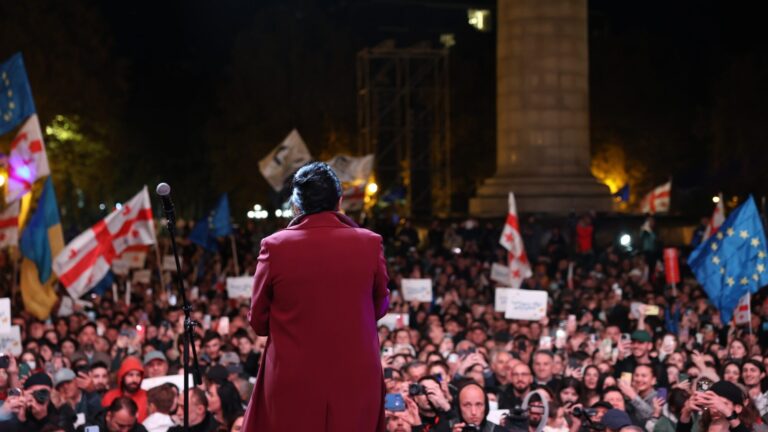An effort to coax Chinese President Xi Jinping into mediating between Moscow and Kyiv on the West’s terms has largely been in vain. In Beijing, French President Emmanuel Macron and European Commission President Ursula von der Leyen met a leader who showed little inclination to budge.
“The Russian aggression in Ukraine was a blow to stability [in the world],” Macron started off on Thursday, as he stood next to Xi during their joint press appearance. “I know I can count on you to bring Russia to its senses and bring everyone back to the negotiating table,” he said to the Chinese leader.
Using his Gallic charm he politely reminded China of its role in the world and even cast it in the role of potential mediator. It was a presumptuous move on Macron’s part. Xi, in typical fashion, remained unmoved.
In Beijing’s view, European countries—due to U.S. influence—are largely constrained in conducting an independent foreign policy.
Speaking in vague generalities, Xi evinced little interest in following Macron’s, or indeed the U.S.’ playbook.
“Peace talks should resume as soon as possible, taking into account reasonable security requirements of all parties and in accordance with the UN Charter,” Xi said.
China was committed to finding a long-term, stable solution, he continued.
Indeed, while Xi spoke about the crisis in Ukraine, he never once mentioned Russia. Instead, he stated that civilians should be protected, that no biological or nuclear weapons should be used and that China expects restraint from all partners.
Clearly, any hint of Beijing distancing itself from Moscow was never in the cards.
While both European leaders held separate talks with Xi, they also spoke to him together. After Xi’s meeting with both Macron and von der Leyen, the latter noted that “it was interesting to hear that President Xi reiterated his willingness to speak” to Zelensky, and that such a conversation could happen when the “conditions and time are right.” In his own comments, Xi did not mention any such plan was in the works.
Von der Leyen has never been one to shrink away from unsparing criticism of China. Indeed, shortly before her trip to Beijing, in a surprisingly tough speech, von der Leyen called on Europe to insure itself against possible risks posed by an ever more powerful China.
Where Washington argues for ‘de-coupling,’ she made the case for ‘de-risking.’ Sino-EU economic relations would be maintained, but safeguards would be put in place concerning trade in technology that could serve military or surveillance ends.
That speech was poorly received by Beijing. China’s ambassador to the EU, Fu Cong, said it contained “a lot of misrepresentations and misinterpretations” and that it “deliberately distorted Chinese positions.”
In Beijing, she discussed this strategy with both Premier Li and President Xi. “It was important to discuss with President Xi why we think derisking is important and not decoupling,” she said at a press conference.
Both European leaders made it clear to Xi that the delivery of arms to Russia will lead to an immediate and firm response. “Arming the aggressor is a clear violation of international law,” von der Leyen said, adding that such an act “would significantly damage EU-China relations.”
Moreover, in February, von der Leyen had taken issue with China’s 12-point peace plan for Ukraine, calling it “selective,” and built upon “misplaced” ideas of security interests, while blurring the roles of the aggressor and the victim.
Some diplomats, including EU foreign chief Josep Borrell (who has scheduled a trip to China for next week), believe that privately, China has strong reservations about the war.
Meanwhile, the Kremlin views any negotiations, even with China as a mediator, as implausible. “China has a very effective and impressive potential for mediation, and China’s recent diplomatic successes have eloquently demonstrated this,” said government spokesman Dmitry Peskov.
“But the situation with Ukraine is still difficult, so far there are no prospects for a peaceful settlement.” Given “the position, official and unofficial, that has been communicated to Kyiv,” Moscow did not yet have “any other way but to continue the special military operation,” he added.
Besides the diplomatic nature of the trip, trade between France and China was also on the agenda. In that domain, the outcome for France was modest. France’s Airbus signed a new agreement to build a second assembly line for the Airbus A320 family on Chinese soil. French state utility EDF and Chinese utility CGN, both major operators of nuclear plants, meanwhile signed a deal to renew a long-standing partnership. Deals were also signed between EDF and China Energy Investment Corporation for offshore wind projects.
In addition, a long-stalled Sino-EU trade agreement, still to be approved by the European Parliament, ended up being put on hold yet again. According to von der Leyen, this ‘Comprehensive Agreement on Investment’ did not even come up in her talks with China’s representatives. Asked whether the agreement had died on the vine, she said it should be “reassessed.”





